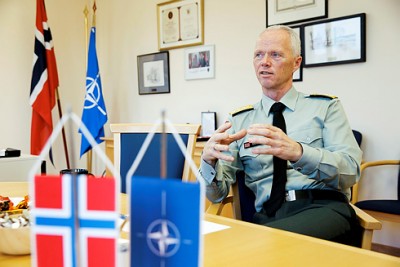Norway’s top military envoy to NATO agrees with Defense Minister Ine Eriksen Søreide that the country has landed in a new period of much colder relations with Russia that won’t warm up any time soon. Russia’s Embassy in Oslo, meanwhile, has published its foreign ministry’s diplomatic response to last week’s confirmation of a stronger Nordic and Baltic military cooperation.

Lieutenant General Robert Mood, who represents Norway’s defense chief on NATO’s military committee in Brussels, told newspaper Dagens Næringsliv (DN) recently that he doesn’t think relations between Russia and other Western nations will improve until Russian President Vladimir Putin loses power.
“NATO doesn’t accept borders being changed in Europe, but it’s become more and more clear that Putin’s goal is to prevent the countries that lie in the former Soviet Union’s field of interest from being free to choose their own path,” Mood told DN. “All indications are that we’re facing a fundamental and long-term antagonism between the West and Russia.”
That’s in line with Søreide’s comments during a recent live interview on CNN, which stirred some controversy within Norway. Some opposition politicians in Norway felt Søreide was adopting too hard of a line towards Norway’s neighbour in the far north, with which Norway has nurtured a “special relationship” for decades. Comments made by Mood, who has years of international experience and recently served as head of the UN forces in Syria, suggest her outlook is simply realistic.
Putin unlikely to change course
Mood is convinced that Putin won’t change course, and will continue to be aggressive in challenging the sovereignty of former Soviet countries.
“We can put our trust in diplomacy, but the way it looks today, with the willingness and ability that Putin has to violate borders, there’s nothing to suggest he’ll change his approach,” Mood said. Other experts have also raised concerns over what might happen in a post-Putin era, especially if even a harder-line Russian nationalist assumes power.
Mood doesn’t believe Putin is operating from a position of weakness, with his back against the wall. “No, what we see from the military side is that Russia has again built up a conventional military force and is willing to use it,” Mood told DN. “That willingness is hardly a sign that Putin is in a weak position. With strong public support, Putin is fronting Russian identity as an alternative to western values and leadership.”
‘Prepare for more ‘surprises’
Mood said that Norway and NATO need to be prepared for more “surprises,” like the one that came when Putin “took Crimea” from Ukraine. “We can be surprised again, and just have to make sure that this alliance (NATO) is prepared,” Mood told DN.
Now a new alliance of sorts is forming among the Nordic and Baltic nations that have special interests because of their geographic proximity to Russia. The Nordic nations have cooperated for years and that cooperation is now being strengthened, according to a commentary written by government ministers of all five countries: Norway, Sweden, Denmark, Finland and Iceland. They’re also planning more join exercise and cooperation with the three Baltic countries: Estonia, Latvia and Lithuania. All are members of NATO except Finland and Sweden, where debate has resumed over whether perhaps they should join. Both Finland and Sweden are members of the EU, which also cooperates with NATO.
Russia responds
Russia’s foreign ministry issued a statement during the weekend expressing concern over the strengthened Nordic-Baltic cooperation. Russia’s embassy in Oslo has published the statement, which notes that in Russia’s view, “the Nordic countries have begun to align their defense strategies against Russia, and this could undermine the positive and constructive regional cooperation in the North that has been building over the past few decades.” That’s likely a reference to recent military cooperation and agreements that, for example, have opened the borders for Norwegians and Russians living within a certain range of the border crossing east of Kirkenes.
The statement noted that “increasing efforts (by) Finland and Sweden, whose official policy is military non-alignment, to ensure rapprochement with the NATO military bloc” is of “particular concern.” The Russian foreign ministry accused the Nordic ministers of “imposing openly confrontational approaches on the public opinion of Northern European countries,” instead of opting for an “open and constructive dialogue in pursuit of joint solutions to strengthening security in Northern Europe and the entire continent, including a resolution to the domestic conflict in Ukraine.”
Asked whether Putin may attempt to take over the Baltic countries again, Mood said that “can’t be ruled out.” He claimed, though, that “it’s become clear in Moscow that there’s a very clear border around NATO countries, which the Baltics are. Unity within NATO has become stronger with Russia’s aggression. And when we now operate in cooperation with the EU, we are strong. Our military abilities are also greater than Russia’s.”
newsinenglish.no/Nina Berglund

